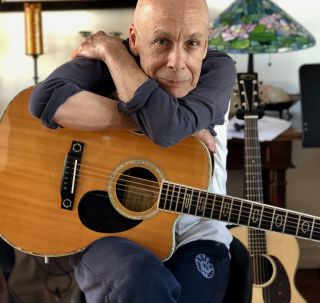Creativity
Overcoming Musician’s Block
When you don't feel like you can play or write, these tools could help.
Posted October 2, 2023 Reviewed by Gary Drevitch
Key points
- Addressing creative obstacles in music composition and performance is a common challenge for musicians.
- Experimentation with alternative musical genres or instruments can stimulate inspiration.
- Artists grappling with an unwillingness to play can grant themselves the space for rejuvenation.
Addressing creative obstacles in music composition and performance is a common challenge encountered by artists across various domains. It doesn’t matter what your musical state of mind is at the moment; this post could help you begin to overcome these hurdles and reignite your musical inspiration.
I have been a music therapist for over 25 years, and I believe I have encountered most of the blocks that musicians, from those on film and television to those to playing top clubs in L.A. and New York, have had to deal with. Following are some of the basic psychological tools that can help you get past your musical blocks and reignite your creative process.
Firstly, if you find yourself grappling with a diminished desire to engage with music, it's crucial to grant yourself the space and time for rejuvenation. Temporary lulls in motivation are natural and can be seen as opportunities for personal growth. Take the opportunity to explore diverse interests and grant your creativity a respite.
As another approach, research by Pressing (1988) illuminated the efficacy of structured improvisation, which imposes constraints to guide the creative process. Embracing this method can yield novel ideas by altering your musical approach.
Musical writer's block, often a frustrating impediment to creativity, can be alleviated through various techniques. Research by Kenny and Osborne (2006) underscores the potential of cognitive-behavioral techniques to reframe negative thought patterns, which may contribute to creative stagnation. Furthermore, experimentation with alternative musical genres or instruments can stimulate inspiration, as highlighted by Pressing's findings (1988).
If doubts concerning your musical aptitude persist, consider reflecting on your artistic journey. Research by Hays and Minichiello (2005) indicated that visualization techniques, wherein musicians engage in mental rehearsals, can alleviate performance anxiety and enhance creative output. Also seek encouragement from peers and mentors who can provide valuable perspectives and reaffirm your capabilities.
I have always been a strong believer in visualization, and I have clients who use it before every show (and often in between). Take a lesson from these great guitar players: The trick is to “imagine” you are on stage or in the studio and pretend that you are playing the tune of your life. It does transfer to the venue you are performing in.
Setting attainable goals is a practical approach to surmounting creative inertia. Small milestones, such as mastering a new chord or covering a favorite song, can boost confidence and chip away at mental barriers.
Remember: The creative process is characterized by peaks and valleys. Your ability to navigate these fluctuations with patience and an open mindset is vital. By integrating visualization techniques, structured improvisation, and cognitive-behavioral strategies, you can construct a holistic framework to tackle creative blocks effectively. And don't hesitate to embrace imperfection. The pursuit of perfection can often stifle creativity. Instead, give yourself permission to create something messy, raw, and authentic. Remember that some of the most iconic music has come from moments of genuine expression, regardless of whether they were "flawless" or not. If you find that the pressure you're putting on yourself is causing a block, try setting aside specific times to play without expectations. Create a musical playtime during which the sole purpose is to have fun, experiment, and enjoy the process without any judgment.
So take a moment to center yourself, pick up your instrument, and allow the music to flow. Research-supported techniques are tools in your arsenal, assisting you in this artistic journey. With dedication and an array of strategies at your disposal, you can rekindle your musical passion and conquer creative obstacles.

10 Tips for Releasing Musician’s Block
Research on creativity and overcoming creative blocks is a dynamic field, and many factors contribute to a person's creative process. Here are some additional ideas based on established principles.
- Mindfulness and Relaxation Techniques. Research has shown that practicing mindfulness and relaxation exercises can help reduce stress and anxiety, which can be major contributors to creative blocks. Techniques such as meditation and deep breathing can clear your mind and open it up to new ideas.
- Change Your Environment. Sometimes, a change of scenery can do wonders for creativity. Go for a walk, visit a new place, or simply rearrange your workspace. Different surroundings can stimulate fresh ideas.
- Collaboration. Collaboration with other musicians or artists can provide new perspectives and ideas. Studies have shown that group dynamics and brainstorming can enhance creativity. Sharing ideas and working together can lead to unique creations.
- Regular Practice. Even when you don't feel particularly inspired, sticking to a regular practice routine can help you maintain your skills and keep the creative juices flowing. This discipline can be instrumental in overcoming periods of low motivation.
- Set Clear Goals. Setting specific, achievable musical goals can provide motivation and direction. Whether it's learning a new song, mastering a new technique, or completing a composition, having a goal in mind can give you a sense of purpose.
- Embrace Imperfection. Perfectionism can often lead to creative blocks. Not every piece of music you create has to be a masterpiece. Embrace imperfection and use it as an opportunity to learn and grow as a musician.
- Seek Feedback. Sharing your work with others and seeking constructive feedback can provide valuable insights and motivation to improve. It can also help you overcome doubts about your talents by receiving positive reinforcement.
- Study Theory and History. Exploring music theory and studying the work of other musicians can provide inspiration and new ideas. Understanding the structures and techniques used in different genres can broaden your musical toolkit.
- Keep a Creative Journal. Keeping a journal to jot down ideas, thoughts, and emotions related to your music can be a valuable resource. It can help you track your progress and identify patterns in your creative process as well as insights you might have missed in the moment.
- Take Breaks. It's essential to give yourself permission to take breaks when needed. Sometimes, stepping away from your music for a while can lead to a fresh perspective when you return.
Techniques like these provide valuable insights into strategies for overcoming musical blocks and enhancing creativity. However, it's important to note that combining multiple approaches may yield the best results. Also, while these strategies are grounded in principles of creativity and motivation, it's important to recognize that each artist's creative process is unique. What works for one may not work for another. Experiment with different approaches, and over time, you'll develop your own toolkit for overcoming creative blocks and staying inspired in your musical journey.
Getting over a creative block takes time, patience, and self-compassion. It's all part of the journey, and overcoming this obstacle will only make you a more resilient and versatile musician. So, take a deep breath, pick up your instrument, and let the music flow. You've got this.
References
1. Visualization Techniques: Research by Hays and Minichiello (2005) found that visualization techniques, where musicians mentally rehearse their performances, can help reduce performance anxiety and enhance musical creativity.
Reference: Hays, T., & Minichiello, V. (2005). The contribution of music to positive aging: A review. Journal of Aging, Humanities, and the Arts, 15(3), 280-288.
2. Flow State: Csikszentmihalyi's concept of "flow," characterized by complete absorption and focused attention, has been associated with enhanced creativity in music. Research by Nakamura and Csikszentmihalyi (2002) discusses how achieving a flow state can improve musical performance and creativity.
Reference: Nakamura, J., & Csikszentmihalyi, M. (2002). The concept of flow. In C. R. Snyder & S. J. Lopez (Eds.), Handbook of Positive Psychology (pp. 89-105). Oxford University Press.
3. Structured Improvisation: A study by Pressing (1988) explored structured improvisation as a method to overcome creative blocks in music composition. It involves setting constraints or rules to guide the improvisation process, which can stimulate creativity. Reference: Pressing, J. (1988). Improvisation: Methods and models. In J. A. Sloboda (Ed.), Generative processes in music (pp. 129-178). Oxford University Press.
4. Emotion Regulation: Research by Juslin and Västfjäll (2008) delves into the emotional aspects of music making. Learning to regulate your emotions through music can help overcome blocks related to lack of motivation or negative emotions. Reference: Juslin, P. N., & Västfjäll, D. (2008). Emotional responses to music: The need to consider underlying mechanisms. Behavioral and Brain Sciences, 31(5), 559-621.
5. Cognitive Restructuring: A study by Kenny and Osborne (2006) investigated the effectiveness of cognitive-behavioral techniques in dealing with performance anxiety in musicians. Cognitive restructuring techniques help musicians change negative thought patterns that can lead to creative blocks. Reference: Kenny, D. T., & Osborne, M. S. (2006). Music performance anxiety: New insights from young musicians. Advances in Cognitive Psychology, 2(2-3), 103-112.
6. Collaboration and Social Interaction: Research by Sawyer (2006) highlights the role of collaboration and social interaction in fostering creativity among musicians. Collaborative musical experiences can break down creative barriers. Reference: Sawyer, R. K. (2006). Group creativity: Musical performance and collaboration. Psychology of Music, 34(2), 148-165.




